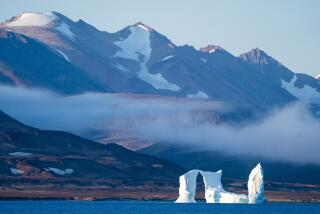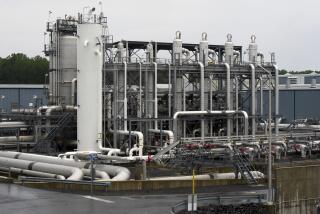Shell’s controversial Arctic drilling effort ends for ‘foreseeable future’
It was only in recent weeks, after Royal Dutch Shell had spent eight years and more than $7 billion in its controversial effort to drill for oil in the Arctic Ocean, that the company finally began to drill deeply into what it believed was a promising expanse of seafloor off the coast of Alaska known as the Burger Prospect.
For months, the company’s chief executive, Ben van Beurden, had sought to explain why Shell continued to pursue the project amid increasing political and logistical challenges and a particularly stark financial one – the steady decline in the price of oil, which has fallen by more than 50% in the last year and has spent the summer below $50 a barrel.
“Alaska is a long-term play,” Van Beurden said in a conference call in August. “That is the way you have to look at it. We can’t be driven by today’s, tomorrow’s, or next year’s, or last year’s oil price.”
Yet that long-term play is suddenly over – or at least on prolonged pause – after Shell announced Monday that several factors led it to abandon the project “for the foreseeable future.” Just like that, the seemingly intractable debate over drilling in the American Arctic was effectively moot – a development all the more striking for the similar responses it prompted from environmental groups and industry experts.
Shell, they said, had always been taking considerable risks by choosing to drill in a remote and unforgiving environment where costs and political pressure are high.
“From the beginning, Shell was pushing the envelope economically,” said Michael Lynch, an oil industry consultant who is president of Strategic Energy and Economic Research. “It was kind of a hail Mary pass.”
NEWSLETTER: Get the day’s top headlines from Times Editor Davan Maharaj >>
Michael LeVine, an Alaska lawyer for Oceana who has helped fight Shell in court for years, said Shell was making an economic decision that also reflected the complex environmental and regulatory challenges his and other groups always said made Arctic drilling unwise.
“Shell invested significantly more money than its competitors, moved much more aggressively than the other companies and now has nothing to show for it other than billions of dollars in losses and damage to its reputation,” LeVine said. “Its failure should serve as a significant cautionary tale for the future.”
After reaching more than a mile below the seafloor, Shell said Monday that it had “found indications of oil and gas” in the drilling area, known as Burger J, but that “these are not sufficient to warrant further exploration in the Burger prospect.”
The company that had previously presented itself as immune to markets of the moment summed up the situation in a single sentence: “This decision reflects both the Burger J well result, the high costs associated with the project, and the challenging and unpredictable federal regulatory environment in offshore Alaska.”
Shell had faced years of delays in the Arctic from lawsuits and from its own logistical problems.
During an exploratory effort in 2012, Shell drilling rigs ran aground. This year, a support vessel, the MSV Fennica, suffered a gash in its hull that forced the company to send the ship to Portland, Ore., for repairs before it could reapply for federal permits to drill into oil-bearing zones.
Once the Fennica was fixed, Shell was delayed from leaving Portland for much of a day by Greenpeace activists who rappelled from a bridge to block its path. The vessel eventually threaded between protesters dangling from ropes only a few dozen feet away.
Given Shell’s apparent determination, some environmental groups were startled by the company’s decision to pull out. Some had been preparing strategies to respond in the event Shell announced a significant find. Yet when the news broke, many were quick to declare victory -- and momentum, arguing that the decision affirmed the need to shift away from fossil fuels to fight climate change.
“The Arctic Ocean once again proved to be the challenging and unpredictable environment we know it to be,” said Brad Ack, the senior vice president for oceans at the World Wildlife Fund. “We must stop expending resources and time seeking to exploit fossil fuels from the most hostile and remote places on the planet and risking irreversible environmental damage. We need to redirect that energy to accelerate our nation’s transition to a future powered by clean, renewable energy.”
Some industry analysts noted that Shell is going through a costly acquisition of the British energy company BG Group and said heavy costs associated with it may have played a role in the Arctic decision. Shell said it “continues to see important exploration potential in the basin, and the area is likely to ultimately be of strategic importance to Alaska and the U.S.”
Sen. Lisa Murkowski (R-Alaska) made a similar argument, while criticizing federal restrictions on Arctic drilling as burdensome.
“There is also more at stake here than the current status of one company’s exploration program,” she said. “Development in the Arctic is going to happen – if not here, then in Russia and Canada, and by non-Arctic nations. I personally believe that America should lead the way.”
Lynch, the consultant, said he, too, believed the Alaska Arctic could become viable again, though not for perhaps two decades or more. Before then, he said, shale reserves in the continental United States as well as oil off the Gulf Coast, off the coasts of Brazil and West Africa and in the Middle East probably will prove more profitable to develop.
Shell has been most active in the U.S. Arctic, but other companies, including ConocoPhillips and Statoil, own leases there but are not pursuing drilling.
Many environmentalists say they are hopeful that renewable energy will replace fossil fuels long before Shell or some other company makes another push in the Arctic.
Lynch said of that notion, “Environmentalists tend to just be blindly optimistic about renewable energy.”
Twitter: @yardleyLAT
ALSO:
Nature replants its own burned forests, environmentalists say
Trump’s tax cuts could cost U.S. trillions of dollars, experts say
Is Sheriff Joe Arpaio of Arizona in contempt over racial profiling?
More to Read
Start your day right
Sign up for Essential California for news, features and recommendations from the L.A. Times and beyond in your inbox six days a week.
You may occasionally receive promotional content from the Los Angeles Times.







